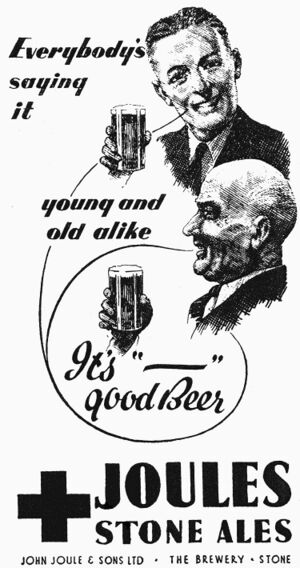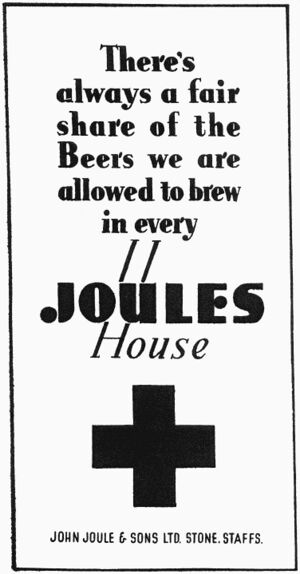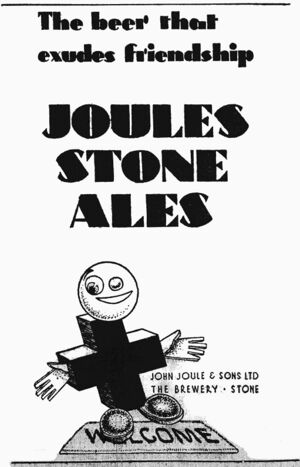Joule & Sons - An Essay
JOHN JOULE AND SONS OF STONE, STAFFORDSHIRE by Philip A Talbot MA BA Hons ACMA FMAAT AIMgt Senior Lecturer Accounting and Finance Staffordshire University
Joules, (pronounced jowls in the local vernacular), was the long standing producer of Stone Ales, that ceased production in 1974 after it was purchased by Bass Charrington. The name was revived in 1994 with the establishment of an off-licence in the High Street, Stone, selling keg and bottled beers under the Joules name made to original recipes brewed by Coach Houses of Warrington. Such has been the demand locally for these beers that the refurbished, Swann Inn was reopened in May 1999 to sell Joules beers from the keg.
The Joules connection with Stone, and brewing can be traced back to 1780. A Francis Joule, maltster, came into possession of the Brewhouse, and White House Inn in 1758 where he prospered according to Barnard’s 1889, “Noted Breweries of Great Britain and Ireland”, Volume III. In 1780 a “public brewery” was established that supplied both Joules own outlets, and other local public houses. The Joule family originated from Youlgreave, Bakewell, Derbyshire, and a William Joule established a brewery in Salford, Lancashire which was eventually sold in 1854.
The Stone enterprise flourished, and further land was acquired in 1797 in the High Street to cope with the additional production. The Joules brewery business was named “John Joule, and Sons”, being named after John Joule the son of Francis, and the latter became the manager of the business in 1813. The Staffordshire Directory of 1818 lists a John Joule, brewer, seed crusher, and corn miller living in Market Street, Stone. The Joule family connection carried on into the third generation when John Joule’s second son, John Smith Joule took over the management of the business, the youngest son becoming the brewer whilst the eldest son defected to rival brewers in Burton on Trent. John Smith Joule at some time took his brother in law, William Matthews, into partnership, and this arrangement persisted until 1873. In this year the direct Joules family connection ended when the business was sold to three Liverpool brewers, John Parrington, and Thomas and John Harding.
The success of the brewery, and its products arose because it drew its brewing waters from the same North Staffordshire watertable as did the other larger brewers in Burton on Trent. The water quality featured in later Joule’s advertisements where it was stated, “The Water from the Rock gives this Ale in Brewing the advantages of keeping in almost any Climate”. The high quality of Joules beers was internationally recognised since its products were exported to the Antipodes, Europe, and the USA following the development of the transport infrastructure serving the town. This originally took the form of the Trent and Mersey Canal which passed behind the company’s Newcastle Street Ale Stores, which still exist today. This was later replaced by a rail link when Stone became a major junction of the North Staffordshire Railway. The major port of export was Liverpool for the USA, unsurprising given the involvement of Parrington, and the Hardings whose other business interests were located in that city, although Hull was also used for European exports. The high quality of Stone Ale was remarked upon in an American newspaper thus:-
“the quality of this famous old English Ale, so long and favourably known to that market, is today the same as it was twenty five years ago, and is to be found as a favourite in many of the English alehouses in town.” San Francisco Chronicle, 14th July 1887
The brand identity of Joules had always been a red cross, and the trade name Stone Ale was copyrighted by the company in 1888. However, the formation of the international Red Cross Agency in 1864, and the British Red Cross Society in 1870 created a problem. The company was anxious not to lose its brand identity, and the problem was adroitly avoided when Parliament allowed Joules the retention of the company’s red cross provided that it was displayed on a green background. Henceforth, this corporate badge of identity was retained until the company ceased trading in 1974.
A large amount of the Joules records have been deposited in the Stafford Record Office, and an examination of the “Cost Price Books”, 1903- 1921, give details and costs of each batch of beer brewed. The product range identified from the cost price book includes, Coronation Ale, Export Ale, Stout, Export Stout, Porter (very limited production), and others given either just a series of letters, e.g. XXXX or a combination of letters, and numbers, e.g. 2B. A much later advert, probably from the period of the late 1950's allows some of these types to be identified thus:-
| MARKS | Price List | Hhds | Barrels |
| 2 | Stone Ale | 90s | 60s |
| 1B | East India Pale | 90s | 60s |
| 2B | 81s | 54s | |
| A1 | Export | 108s | 72s |
| 1 | 99s | 66s | |
| 3 | Mild Ale | 81s | 54s |
| 4 | 72s | 48s | |
| 5 | 63s | 42s | |
| X | 54s | 36s | |
| Ex | Extra Stout | 72s | 48s |
| P | Stout | 63s | 42s |
Additionally the company offered a range of beers which could be brewed specifically for private use, thus:-
| Marks | Price List | Hhds | Barrels |
| 3S | Mild Ale | 54s | 27s |
| 4S | 48s | 24s | |
| 5S | 42s | 21s | |
| XS | 36s | 18s |
An experimental “proposed” light bitter for private trade had been brewed in December 1914, and it may be that this was the forerunner of the mild ale that was latter being offered. Barnard stated that in his opinion. Stone Ale was:-
“a splendid product of this brewery from time immemorial, has been aptly described as nutritious beverage, possessing powerful tonic properties, and of a delicate flavour. We do not wonder, therefore that the British working man finds it so nourishing.”
Many awards were gained by the Joules products, the 1919 silver medal at National Exhibition of Brewing and Allied Trades, the bronze medal in 1925 and gold, silver and bronze medals in 1926. Other medals were gained in 1932, 1935, and 1937, and the Brewery Trade Review Challenge Cup of 1957 for the best bottled beer in Britain.
The incorporation of many breweries in the latter part of the nineteenth century also saw Joules become a limited company in December 1898.
The majority of the share capital was held by the Harding and Parrington families. Duncan’s Manual of British and Foreign Brewery Companies reported in 1903, Joule (John) and Sons Limited comprised:-
“91 fully licensed freehold, copyhold and long leasehold hotels and public houses; 46 freehold beer houses; 12 freehold off-licensed shops, 111 freehold and long leasehold shops, offices, dwelling houses, and 80 acres of freehold land held in conjunction with licensed properties, all of which are situate in Staffordshire, Shropshire and Cheshire.”
The disappearance of the distinct Joules brand, and public houses in 1974 has now been recently reversed with the opening of the Swann Inn, Stafford Street, Stone, which was originally a Joules public house dating back to 1851. The inn was built in the latter part of the eighteenth century as a warehouse backing on to the newly constructed canal link between Stone, and Shardlow.
It is a Grade II listed building that narrowly averted demolition with construction of recent modern road improvements. The Joules product range is brewed by Coach House of Warrington to original recipes supplied by former employees, currently comprising:-
• Old Priory, a smooth traditional beer, 4.4% ABV • Victory Brew, a dark bitter first brewed in 1945. 5.2% ABV • Swan Bitter, a light coloured “hoppy” beer brought out to celebrate the first “Joules” house in twenty five years, 4.3% ABV
This is complimented by other real ales on the menu. The new venture has been highly successful, and the aim of its owners is to open further public houses locally, and ultimately establish a micro brewery at the rear of the Swann Inn to brew the Joules beer once again in Stone thus renewing a two hundred year old tradition. See Joule's Brewery Ltd.


